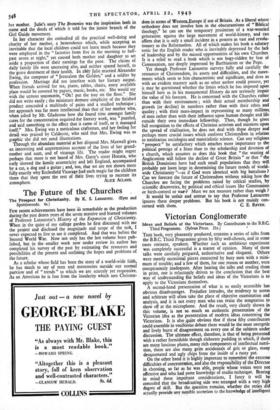The Future of the Churches
The Prospect for Christianity. By K. S. Latourette. (Eyre and Spottiswoode. 6s.)
FEW recent achievements have been so remarkable as the production during the past dozen years of the seven massive and learned volumes of Professor Latourette's History of the Expansion of Christianity. When in the quiet of my college garden he first discussed with me the project and disclosed the magnitude and scope of the task, I never expected to live to see it completed. And that was before the Second World War. Now not only has the last volume been pub- lished, but in the smaller work now under review its author has completed his survey of the past by estimating the resources and possibilities of the present and outlining the hopes and problems of the future.
As a scholar whose field has been the story of a world-wide faith, he has much to say of men and movements outside our normal purview and of " trends " to which we are scarcely yet responsive. As an American he is free from the insularity which sees Christen-
dom in terms of Westera.Europe if not of Britain. As a liberal whose orthodoxy does not involve him in the obscurantisms of " Biblical theology," he can see the temporary pessimism of a war-wearied generation against the large movement of world-history, and can affirm that it is only a small incident in a process as vast and revolu- tionary as the Reformation. All of which makes his book a salutary tonic for the English reader who is inevitably depressed by the lack of leadership and by the missed opportunities of his own Churches. It is a relief to read a book which is not bogy-ridden by fear of Communism, nor deeply impressed by Barthianism or the Pope.
Yet though Professor Latourette surveys fully and carefully the resources of Christendom, its assets and difficulties, and the move- ments which seem to him characteristic and significant, and does so with an evident mastery such as no other author could possess, yet it may be questioned whether the limits which he has imposed upon himself here as in his monumental History do not seriously impair the value of his forecast. He is concerned with the Churches rather than with their environment ; with their actual membership and growth (or decline) in numbers rather than with their ethos and quality ; with their mass-impact in representing so many millions, of men rather than with their influence upon human thought and life outside their own immediate fellowship. Thus, though he gives full recognition to the effects of Christian activism and missions upon the spread of civ,ilisation, he does not deal with those deeper and perhaps more crucial issues which confront Christendom in relation to totalitarian sociologies and materialistic science. Can any religious " prospect " be satisfactory which attaches more importance to the political prestige of a State than to the scholarship and devotion of a church, which assumes as does this book that " the waning of Anglicanism will follow the decline of Great Britain " or that " the British Dominions have had such small populations that they will probably not loom large in determining the future trends of world- wide Christianity "—as if God were identical with big battalions ? Can we forecast the future of Christendom without asking how the Churches are facing the problems raised by critical studies, by scientific discoveries, by political and ethical issues like Communism or birth-control or ware? Must we not measure rather than weigh ? It would be unfair and untrue to say that Professor Latourette ignores these deeper problems. But his book is not mainly con-


































 Previous page
Previous page